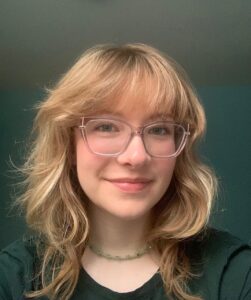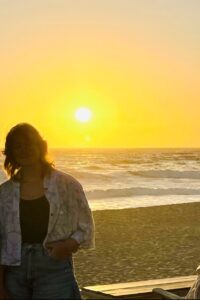 Kaylynn Walmsley, a Grade 12 student from Millarville, Alberta, was browsing her email when a message from King’s caught her attention. She opened it, read it and was surprised to learn that she won the 2024 King’s Essay Writing Contest.
Kaylynn Walmsley, a Grade 12 student from Millarville, Alberta, was browsing her email when a message from King’s caught her attention. She opened it, read it and was surprised to learn that she won the 2024 King’s Essay Writing Contest.
“My initial reaction was just shock,” said Walmsley. “I was at home with my brother and I read the email out loud. He wasn’t surprised but I was.”
The King’s Essay Writing Contest is an annual competition for Grade 12 students that invites them to write a 1,000-word essay in response to a question. Entrants use a text of their choice to support their arguments. This year’s question asked, ‘How has a particular work of literature informed your understanding of the world today?’
Walmsley selected a book that had a positive impact on her outlook, Cosmos by Carl Sagan. It’s a book she says she has read at least ten times since 2013. Published in 1980, it explores the universe and humanity’s place within it. With her essay, “Appreciating Cells and Other Starstuff,” Walmsley introduces the reader to this expansive text—one that marvels at every tiny piece of the universe and how it all fits together into a living whole. Walmsley also describes how Cosmos influenced her interest in scientific exploration and conservation and ultimately, gave her hope for the future.
Walmsley says she was inspired by Sagan’s insistence on being creative during the process of scientific discovery, and the important role that science plays in opening up our minds to new ideas. In her prize-winning essay, she wrote, “Sagan created an incredibly motivating portrayal of scientific progress, and a worldview where mysteries can always be discovered with enough patience.”
“I think that being hopeful is really important in terms of taking action,” said Walmsley. “But I also think it’s the best way to approach science as well, because it can be really intimidating, it is a tough academic field, but having hope…there are so many interesting things out there to discover and I think it’s really beautiful.”
 The most important takeaway for Walmsley is the interest she developed in conservation. She wants to pursue opportunities that will allow her to work in conservation and sustainability and credits Sagan with giving her the optimism necessary for this work.
The most important takeaway for Walmsley is the interest she developed in conservation. She wants to pursue opportunities that will allow her to work in conservation and sustainability and credits Sagan with giving her the optimism necessary for this work.
“I want to contribute to making sure that the next generation understands what Carl Sagan was getting at, which was the beauty of the natural world, and the beauty within the oak trees and the whales and the stars. I think if we have light pollution or mass extinction or deforestation, it becomes a lot harder to appreciate,” said Walmsley.

